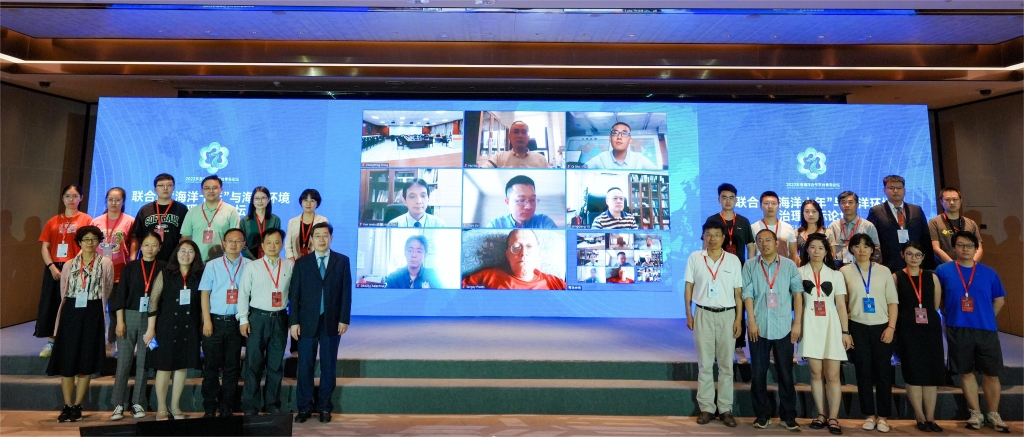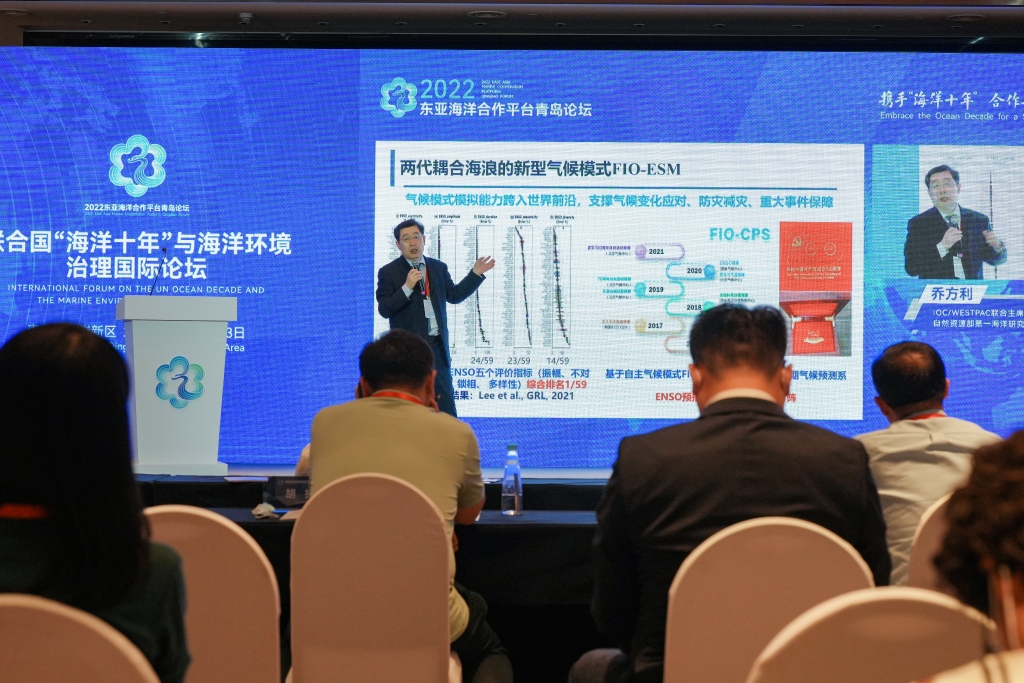International Forum on the UN Ocean Decade and the Marine Environmental Governance were Held in Qingdao West Coast New Area
On June 22, the International Forum on the UN Ocean Decade and the Marine Environmental Governance were held in Qingdao. The forum is themed "Building a leading modern ocean city, and jointly constructing 'predictable oceans' and 'safe oceans' under the framework of the United Nations". Experts from all over the world in ocean-related fields gather together, seeking consensus, sharing good ideas, planning for the future, and promoting marine environmental governance and sustainable development of the global oceans.
The "new generation of earth system model FIO-ESM2.0" was released on the forum. The model was based on FIO-ESM1.0, which was developed by the First Institute of Oceanography of the Ministry of Natural Resources (FIO, MNR) and is also the world's first climate model with wave processes. Four unique physical processes including wave-induced mixing and daily sea surface temperature variation were introduced to FIO-ESM2.0. It significantly improves the simulation and forecasting ability of El Niño-Southern Oscillation (ENSO).
According to introduction, ENSO can cause anomalies in atmospheric circulations such as the Western Pacific Ocean subtropical high and monsoon system, which can in turn affect temperature, precipitation, and drought/flood distribution in China as well as global typhoon frequency and intensity. Accurately predicting the changes of ENSO on monthly, seasonal, and inter-annual scales is not only of great guiding significance for responding to climate change but also a hot issue and academic high ground in the international scientific and technological field. Currently, there are common problems such as tropical deviation in domestic and foreign climate models, which directly affect the prediction accuracy of ENSO.
The latest international assessment result (Lee et al., 2021) indicates that this climate model ranks first globally in terms of comprehensive simulation capabilities for ENSO. Currently, the short-term climate prediction system has been put into quasi-operational use. The predicted results have been adopted by the CMME System and invited to be published on the website of the Laboratory for Climate Studies, China Meteorological Administration.
The FIO-ESM2.0 data has been shared through the CMIP6 and can be downloaded and used by global model evaluation and climate change researchers. It provides an important scientific basis for the Intergovernmental Panel on Climate Change's Sixth Assessment Report.
In January 2021, the Implementation Plan for the "United Nations Decade of Ocean Science for Sustainable Development" (abbreviated as "Ocean Decade") was reviewed and officially launched by the United Nations General Assembly (UNGA). "Ocean Decade" is a United Nations oceanic initiative that aims to "advance transformative ocean science solutions for sustainable development and connecting mankind and the ocean" by proposing seven expected goals, including a clean ocean, a healthy and resilient ocean, a productive ocean, a predicted ocean, a safe ocean, an accessible ocean, and an inspiring and engaging ocean.
As one of the seven major sections of the 2022 East Asia Marine Cooperation Platform Qingdao Forum, this forum is hosted by the Ministry of Natural Resources and the Shandong Provincial People's Government, and undertaken by the First Institute of Oceanography of the Ministry of Natural Resources and the Management Committee of Qingdao West Coast New Area. Taking the "predictable ocean" and "safe ocean" proposed in the United Nations' "Ocean Decade" as the perspective, attending experts conducted in-depth discussions on how to improve ocean observation capabilities and continuously improve prediction capabilities for oceans and climate. The discussions revolved around data and information sharing related to the ocean environment, ocean ecology, and climate change, as well as improving prediction and forecasting systems.
Professor Qiao Fangli, chairman of this forum, academician of the International Eurasian Academy of Sciences, deputy director of FIO, MNR, and co-chairman of the Sub-Commission for the Western Pacific of the Comité Maritime International, analyzed the major scientific challenges faced by ocean and climate prediction over the long term. FIO, MNR has spent decades honing its skills in the field of ocean and climate forecasting and prediction, an international scientific frontier. It has formed a new pattern based on the original wave-induced mixing theory, with the internationally pioneering coupled models of waves-tides-currents-circulation and the first Earth system model with waves as a breakthrough point, and the new and cost-effective surface drift buoy observation as the support. The approved UN Ocean Decade and the Ocean to Climate Seamless Forecasting System (OSF) mega-science program are led by Researcher Qiao Fangli and bring together 34 marine and climate research institutions and 3 international organizations from 25 countries around the world. It will lead the prediction of oceans and climate, provide more accurate forecast products for people around the world, provide more refined service guarantees, and provide Chinese wisdom and solutions for global ocean governance.
On the afternoon of June 22, Kentaro Ando, Co-Chair of the UNESCO/IOC Sub-Commission for the Western Pacific, Dong Changming, Dean of the School of Artificial Intelligence at Nanjing University of Information Science and Technology, Wu Hui, the Researcher of the SKLEC in East China Normal University, Nelly Florida Riama, Director of the R&D Center of the Indonesian Agency for Meteorology, Climatology and Geophysics and 7 other experts, gave online speeches on ocean environmental prediction and the application of artificial intelligence in ocean science. On the morning of June 23rd, Jose Santos, Director of the International Office of the CLIVAR Project, Dr. Meng Xia from the University of Maryland, Researcher Yang Dezhou from the Institute of Oceanology of the Chinese Academy of Sciences, Professor Sergey Prants from the POI Research Institute in Russia, Professor Faizal Abdullah from the School of Marine Sciences at the University Malaysia Terengganu, Researcher Peng Shiqiu from the South Sea Research Institute of the Chinese Academy of Sciences, Professor Yu Weidong, Vice Dean of the School of Atmospheric Sciences at Sun Yat-sen University in China, and Dr. Chalermrat Sangmanee from the Phuket Marine Biological Center in Thailand gave speeches on the development and application of ocean numerical models and ocean environmental prediction systems.
The chairman of the forum, Researcher Qiao Fangli, gave a concluding speech. In his speech, he expressed his gratitude to the forum's guest speakers and experts, and invited experts and scholars from home and abroad to actively participate in the UN Ocean Decade and OSF mega-science program.




